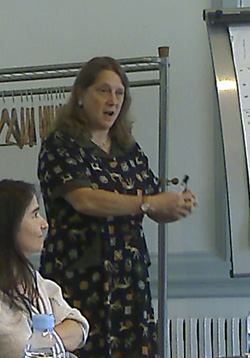Seminar by professor Jane C. Ginsburg, at UOC headquarters, 25 June 2008, about copyright liability of user generated content practices.
Copyright infringement actors
Who’s implicated?
- Users, for uploading copyrighted material, make copies, remix material, etc. If there is no fair use, downloading (and storing in one’s own computer) is a copyright infringement too. Users are directly engaged in copyright infringement.
- Websites, and their operators, for making available copyrighted material. Website operators are directly engaged in copyright infringement too. What happens with host service providers and access providers? Hosts too are directly implicated, as illegal copies are stored in their computers.
- Aggregators of links, though they do not actually have the content on their facilities, they are directly implicated too. But they are in practice making the content available (in a very broad sense) by linking to the one that put it online. A lighter interpretation of the Law would consider these agents as implied in an indirect (not direct) way to copyright liability.
- P2P software distributors and sites, as in the previous case, are indirectly implicated by enabling access to copyrighted content.

Jane C. Ginsburg
To be liable for copyright infringement, the sole existence of the digital file is considered a copy, and hence an illegal copy. On the other hand, technically the transmission of the file should be completed to imply copyright infringement, so not only making the file available but having accessed/copied it should be demonstrated (which is very difficult to) to imply such an infringement. Due to technical difficulties, normally the defendant is asked to demonstrate that actual access did not too place.
Host service providers and access providers, though directly (or indirectly, depending on interpretation) related with copyright infringement, usually have special regulation regimes to protect their economic activities.
Kinds of copyright infringement
Contributory infringement: you furnish the means, with knowledge, to enable copyright infringement. If these means are capable of substantial non infringement use, then the distribution (e.g. mp3 reproducers) is lawful, even if means can be used unlawfully. The problem is what substantial really stands for. So the usual defence is about providing evidence that no knowledge of criminal activities were taking place (e.g. Kazaa not having a central directory of files).
Inducement: what’s the intention behind a specific activity? There’s inducement if there is an explicit promotion for a certain (illegal) use. There’s inducement if there is no filtering (when possible), no intention to prevent illegal uses. And there’s inducement too if there is a business plan closely related to the illegal use. Failure to filter is usually related to a business plan based on this lack of filtering out illegal content.
Vicarious liability: direct financial benefit from the infringement, with right to control it (e.g. hire a band that performs copyrighted music; advertising in sites that illegally distribute copyrighted content).
User Generated Content and copyright liability
A paradox (in legal terms): even if the amount of illegal content on YouTube is a minor part of the whole, the share of visited illegal content is the majority of it. And even if illegal content can be taken down, it comes up within few minutes. [a detailed analysis of YouTube’s liability ensues, too dense to track here].
More info
- Separating the Sony Sheep from the Grokster Goats: Reckoning the Future Business Plans of Copyright-Dependent Technology Entrepreneurs by Jane Ginsburg
- Limitations on liability relating to material online (Digital Millennium Copyright Act / Copyright Law of the United States of America)
- European e-Commerce Directive (Official Journal L 178 , 17/07/2000)
- Principles for User Generated Content Services
- Fair Use Principles for User Generated Video Content
- Projet de loi « Création et Internet »
If you need to cite this article in a formal way (i.e. for bibliographical purposes) I dare suggest:
Peña-López, I. (2008) “Jane C. Ginsburg: Separating the Sony Sheep from the Grokster Goats: the Future of Copyright-Dependent Technology Entrepreneurs” In ICTlogy,
#57, June 2008. Barcelona: ICTlogy.
Retrieved month dd, yyyy from
https://ictlogy.net/review/?p=748
Previous post: Jornades de la Penedesfera: Blogs, Freedom and Governance
Next post: Seminar. José Manuel Robles: Political engagement and ideology of Spanish Internet users
2 Comments to “Jane C. Ginsburg: Separating the Sony Sheep from the Grokster Goats: the Future of Copyright-Dependent Technology Entrepreneurs” »
 RSS feed for comments on this post.
TrackBack URI
RSS feed for comments on this post.
TrackBack URI


Hi Isma,
Nice post.
I suggest including the link to Prof. Ginsburg’s paper available here:
http://ssrn.com/abstract=1095335
Hey, Miquel, thanks for the tip! Added! :)